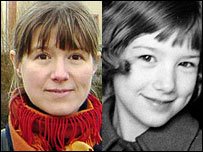
Sean Coughlan BBC News Magazine
In the depths of the Cold War, the daughter of an imprisoned Soviet dissident received a message from across the Iron Curtain that changed her family's life.
In June 1971, Marina Aidova was eight years old, living in the Soviet city of Kishinev. Her father, Slava, was imprisoned in a camp for political prisoners. When his family was allowed a three-hour visit, it took a two-day railway journey to reach him, paid for by her mother donating blood.
When her mother, Lera, found that Slava had been on hunger strike, she too began her own protest by only eating one piece of bread a day.
And then, into this bleak backwater of the Cold War, a letter arrived. It was a postcard addressed to Marina with a picture of an unfamiliar town. "With love from Newbury. Berks. England. Harold and Olive."
"When the first letter came it was like something from another planet. We were living in such a closed society that it was like getting a message from a UFO," says Marina, now aged 43, and speaking on a visit to London, where the story of this unexpected exchange is being published as a book.
"We knew that England existed somewhere, but it was in a world that had nothing to do with us. And the idea that this letter had come through the Iron Curtain seemed unbelievable."
The postcard had come from Harold Edwards, a 73-year-old antiquarian bookseller, and his wife, Olive, prompted by an article published by Amnesty International, which listed the names of the children of imprisoned dissidents.
Marina sent a letter in reply, and so started a 15-year correspondence between Harold and Olive, Marina, Lera and, when he was released, Slava.

